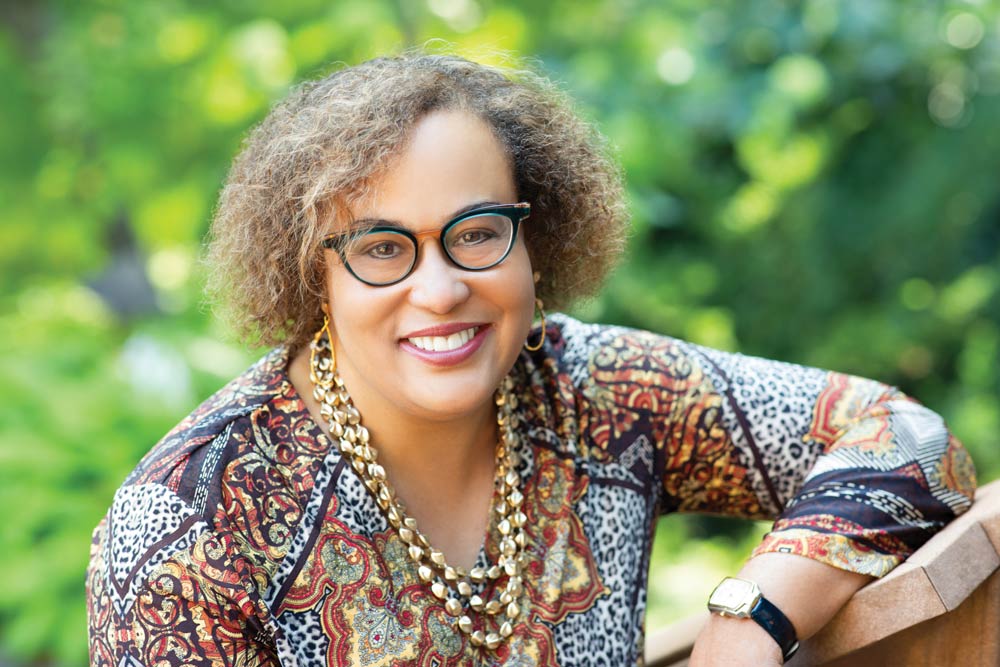
Politics and Civil Unrest in America
(You can run, but you can’t hide)
By Duchess Harris, JD PhD
My writing is influenced by my childhood experiences, my struggles to parent Black children in the city where George Floyd was killed, and my 25 years as an American Studies professor.
I went to Kindergarten in 1974. I was simultaneously filled with anticipation and trepidation. I was excited because I had a secret: I already knew how to read. I was nervous because going to school seemed dangerous; the evening news showed the windows of yellow school busses being smashed with bricks by White PTA Moms. How could this be? I grew up outside of Boston, MA, and I was watching White resistance to forced bussing.
As a child, I would have done anything to have a book explain to me why Black kids like me were not welcome to attend predominately White suburban schools. As an adult, I questioned how difficult it must have been for my parents, who were Southern migrants, to see their dreams of leaving segregation met with hostility. What I know now is that they did not have the tools to explain to me why I was the only Black girl in my Kindergarten class, and why the three Black kids who joined me in the third grade lived an hour away. Once I became a parent, I decided to write the books that my parents and I needed to process being a Black child in suburban America.
I was given the opportunity to publish these books in 2017, when Paul Abdo invited me to curate the Duchess Harris Collection. This line provides scholarly expertise with a collegiate perspective for mid- and high-level grades. In 2018, we expanded the collection by adding the “Freedom’s Promise” series that examines people and events that have influenced society and culture locally, nationally, and internationally.
My new book, Politics and Civil Unrest in Modern America (Abdo, 2021) is a response to the social upheaval of 2020. Americans are fighting back against police violence, calling for departments to be reformed, and, in some cases, abolished. Politicians at local, state, and national levels have responded in a variety of ways to these calls of action. Politics and Civil Unrest in America explores the government’s response to protests and policies introduced by legislators to combat police violence.
When I sat down to craft this book, I reflected on Ruthie Wilson Gilmore’s 2010 Presidential Address at the American Studies Association. She urged us to, “Infiltrate what exists, and innovate what doesn’t.” Freedom’s Promise is an attempt to infiltrate the world of children’s books and innovate a conversation about race that is 400 years overdue.
Politics and Civil Unrest was inspired by my experience of living in the Twin Cities with my family during the summer of 2020. The time between Memorial Day and Labor Day is considered ‘summer’ for most people. For Black people, this is when the Amy Coopers of the world show up in the park and Black men like George Floyd can’t breathe. The disregard for Black Lives was terrible before COVID-19.
Senator Raphael Warnock recently said Black America is suffering from COVID-1619 (in reference to the year when enslaved Africans were first brought to North America). He meant that everything that makes COVID what it is for White America is compounded for Black Americans—because Black Americans were already fragile. Black Americans already had issues with access: sitting in food deserts, places that didn’t have the best housing, that didn’t have community policing or great healthcare. And if you have any of those things, you might not have a job.
That’s what COVID-1619 is. You already had all the problems. Now you’re in a pandemic.
People often ask me what I think is missing in the approach to teaching a full American history. When I was in high school in 1983, the methodology was colorblind. Even though we’ve moved from colorblind to diversity, there still isn’t a lot of conversation about what justice looks like, nor a lot of historical context. You have people who were shocked about George Floyd, because they didn’t learn about Emmett Till in high school. There are only six books in the country written about Emmett Till for fourth- through twelfth-graders.
Regardless of a child’s age, a good way to open up is to ask: What do you see? What do you know? I had my first experience as a parent with this with George Floyd, because when Philando Castile happened, my kids weren’t old enough for technology. When George Floyd happened, I paused and said, “Okay, how am I going to approach this?”
I’ll admit, I was a day late and a dollar short. When I approached my 13-year-old, he said, “I saw the video.” I couldn’t believe that he watched the video, and I told him how concerned I was, and he said, “Mom, 20 million people have seen it on Instagram—why wouldn’t I watch it?” That’s part of it now: you can run but you can’t hide.

Listen to the Meet-the-Author Recording for Politics and Civil Unrest in Modern America.
Hear Duchess Harris’ Audio Name Pronunciation.
Visit Duchess Harris’ blog for Freedom’s Promise.
Text and images are courtesy of Duchess Harris and may not be used without expressed written consent.


Leave a Reply